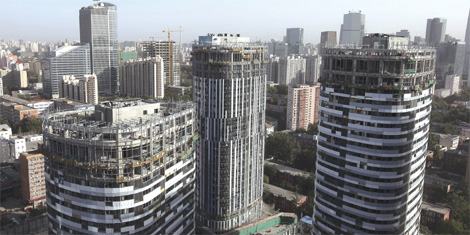Mainland property to ride urbanization wave
Updated: 2010-01-29 07:14
(HK Edition)
|
|||||||
|
Construction work continues at Soho China Ltd's residential and commercial Sanlitun SOHO complex in Beijing. The prospects of the property sector on the mainland remain bright, analysts say. Bloomberg News |
Analysts believe the medium- to long-term prospects for the property sector on the mainland will remain bright, although measures unveiled by the government recently to curb speculations and prevent a bubble from blowing up have hurt sentiment for the sector.
In the short term, the property market will likely see some pressure as a result of the restrictive measures, BOC International said in a research note to investors.
Among the measures, developers are required to pay 50 percent of their land prices immediately upon purchase, against only a 20-30 percent down payment required previously. They also need to settle the balance within one year from now on, whereas they were previously allowed two or more years.
These measures are meant to discourage developers from hoarding land, a common practice now among many developers who are doing so in the hope of reaping huge profits from land value appreciation.

Other measures include tighter mortgage terms for property buyers (other than end users) who usually buy property for investment purpose.
However, in a longer term, the measures will actually be conducive to strengthening the sector, as they aim only at curbing speculation, and will help pave the way for healthy development in the real estate market, BOC International said.
UBS and Nomura are also optimistic about the prospects for the mainland property market in the longer term.
"We are bullish on the mainland property sector," UBS strategist John Tang wrote in a report providing sector outlooks for year 2010.
The country's ongoing and increasingly accelerating urbanization process will be a key driver for growth in this sector for the medium- to long-term, analysts generally believe.
The mainland is only halfway through its urbanization process and the demographic picture should support strong property demand for at least another three years, said UBS analyst Tang, who went on to say, "The spike in property transactions from March 2009 reinforces our view that strong fundamental demand exists."
As part of the country's economic restructuring, the central government is stepping up its urbanization drive, with a target of raising the urbanization level to 55 percent by 2020 from the current 46 percent, which is very low compared with a 66.8 percent in Japan, 90.1 percent in the UK, 89.1 percent in the Australia and 82.3 percent in the US currently.
The economic restructuring - to rely more on domestic demand rather than exports as the key growth engine - has never been more urgent as the export-investment growth model, which has been driving the country's economy, is increasingly looking difficult to sustain - particularly after the global economic downturn.
Wee Liat Lee, a property analyst at Nomura, also views urbanization as a "key fundamental demand driver" for the property sector on the mainland.
"At this early growth stage, the property sector still has plenty of strong untapped fundamental demand to support growth in the sector", he said in a research report.
The report also noted that "at the current pace, the urbanization process implies that 13.3 million people will need new houses in urban areas each year. This translates into around 4.19 million units of new houses."
(HK Edition 01/29/2010 page3)
